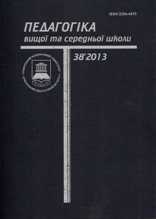Упровадження інклюзивної освіти у Великій Британії: проблеми, шляхи розв’язання
DOI:
https://doi.org/10.31812/educdim.v39i0.3077Ключові слова:
інклюзія, спеціальна освіта, система освітиАнотація
Давиденко Г. В. Упровадження інклюзивної освіти у Великій Британії: проблеми, шляхи розв’язання.
У статті представлено результати аналізу основних проблем інклюзивної освіти у Великій Британії. Розглядаються перешкоди на рівні урядової діяльності, місцевої влади та місцевих громад. Особливу увагу приділено аналізу стану справ у системі шкільної освіти та пошукам шляхів подолання визначених перешкод у доступі до освіти.
Завантаження
Дані завантаження ще не доступні.
Metrics
Metrics Loading ...
Abstract views: 108
/ PDF downloads: 112
Посилання
1. Колупаєва А. А. Інклюзивна освіта: реалії та перспективи : [монографія] / А. А. Колупаєва. – К. : Самміт-Книга, 2009. – 272 с. : іл. – (Серія «Інклюзивна освіта»)
2. Малагская декларация. Декларация министров в Малаге о людях с ограниченными возможностями: «К полному гражданскому участию». – 2-я Европейская конференция министров. – Малага, 7–8 мая 2003 года.
3. Модине М. Доступ людей с ограниченными возможностями к социальным правам в Европе / М. Модине. – Страсбург, 2003. – 185 с.
4. Allan J. ‘Productive pedagogies and the challenge of inclusion’, British Journal of Special Education, 2003, – 30 (4), – 175–179. Direct Link: Abstract PDF(50K)
5. Audit Commission Special Educational Needs: a mainstream issue. London: Audit Commission. 2002.
6. Booth T. ‘Inclusion and exclusion policy in England: who controls the agenda?’ in F. Armstrong and D.Armstrong (eds) Inclusive Education. London: David Fulton, 2000.
7. Byers R. ‘Editorial’, British Journal of Special Education, 32 (3), р. 114–115. Direct Link: Abstract PDF(192K), 2005.
8. Clough P. & Garner G. (2003) ‘Special educational needs and inclusive education: origins and current issues’, in S.Bartlett and D.Burton (eds) Education Studies: essential issues. London: Sage.
9. Croll P. & Moses D. Special educational needs across two decades: survey evidence from English primary schools’, British Educational Research Journal, 2003, 29 (5), 731–747.
10. CSIE (Centre for Studies in Inclusive Education) New Segregation Statistics [online at http://www.//inclusion.uwe.ac.uk]. Bristol: CSIE, 2005.
11. DES (Department of Education and Science) (1978) Special Educational Needs: a report of the Committee of Enquiry into the Education ofHandicapped Children and Young People (Report of the WarnockCommittee). London: HMSO.
12. DfEE (Department for Education and Employment) (1999) The National Curriculum for England [online at http://www.nc.uk.net] London: DfEE.
13. Frederickson N. & ClineT. (2002) Special Educational Needs, Inclusionand Diversity, a textbook. Buckingham: Open University Press.
14. Hanko G. ‘Towards an inclusive school culture – but whathappened to Eltons affective curriculum?’, British Journal of Special Education, 30 (3), 125–131. Direct Link: Abstract PDF (60K),2003.
15. Hodkinson A. ‘Inclusive and special education in the English educational system: historical perspectives, recent developments and future challenges’, Research in Education, 2010, 73, 15–29.
16. Judge B. ‘Inclusive education: principles and practices’, in K.Crawford (ed) Contemporary Issues in Education. Norfolk: PeterFrancis, 2003.
17. Rustemier S. & Vaughan M. (Segregation Trends – LEAs in England 2002–2004. Bristol: CSIE, 2000.
18. Warnock M. Sspecial educational needs – a new look’, Centre for Disability Studies [online at http://www.leeds.ac.uk/disability-studies/archiveuk/archframe.htm.
2. Малагская декларация. Декларация министров в Малаге о людях с ограниченными возможностями: «К полному гражданскому участию». – 2-я Европейская конференция министров. – Малага, 7–8 мая 2003 года.
3. Модине М. Доступ людей с ограниченными возможностями к социальным правам в Европе / М. Модине. – Страсбург, 2003. – 185 с.
4. Allan J. ‘Productive pedagogies and the challenge of inclusion’, British Journal of Special Education, 2003, – 30 (4), – 175–179. Direct Link: Abstract PDF(50K)
5. Audit Commission Special Educational Needs: a mainstream issue. London: Audit Commission. 2002.
6. Booth T. ‘Inclusion and exclusion policy in England: who controls the agenda?’ in F. Armstrong and D.Armstrong (eds) Inclusive Education. London: David Fulton, 2000.
7. Byers R. ‘Editorial’, British Journal of Special Education, 32 (3), р. 114–115. Direct Link: Abstract PDF(192K), 2005.
8. Clough P. & Garner G. (2003) ‘Special educational needs and inclusive education: origins and current issues’, in S.Bartlett and D.Burton (eds) Education Studies: essential issues. London: Sage.
9. Croll P. & Moses D. Special educational needs across two decades: survey evidence from English primary schools’, British Educational Research Journal, 2003, 29 (5), 731–747.
10. CSIE (Centre for Studies in Inclusive Education) New Segregation Statistics [online at http://www.//inclusion.uwe.ac.uk]. Bristol: CSIE, 2005.
11. DES (Department of Education and Science) (1978) Special Educational Needs: a report of the Committee of Enquiry into the Education ofHandicapped Children and Young People (Report of the WarnockCommittee). London: HMSO.
12. DfEE (Department for Education and Employment) (1999) The National Curriculum for England [online at http://www.nc.uk.net] London: DfEE.
13. Frederickson N. & ClineT. (2002) Special Educational Needs, Inclusionand Diversity, a textbook. Buckingham: Open University Press.
14. Hanko G. ‘Towards an inclusive school culture – but whathappened to Eltons affective curriculum?’, British Journal of Special Education, 30 (3), 125–131. Direct Link: Abstract PDF (60K),2003.
15. Hodkinson A. ‘Inclusive and special education in the English educational system: historical perspectives, recent developments and future challenges’, Research in Education, 2010, 73, 15–29.
16. Judge B. ‘Inclusive education: principles and practices’, in K.Crawford (ed) Contemporary Issues in Education. Norfolk: PeterFrancis, 2003.
17. Rustemier S. & Vaughan M. (Segregation Trends – LEAs in England 2002–2004. Bristol: CSIE, 2000.
18. Warnock M. Sspecial educational needs – a new look’, Centre for Disability Studies [online at http://www.leeds.ac.uk/disability-studies/archiveuk/archframe.htm.
Downloads
Опубліковано
21-11-2013
Як цитувати
Давиденко, Г. (2013). Упровадження інклюзивної освіти у Великій Британії: проблеми, шляхи розв’язання. Педагогіка вищої та середньої школи, 39, 308–314. https://doi.org/10.31812/educdim.v39i0.3077
Номер
Розділ
Проблеми становлення і розвитку освітньої парагдими: історико-педагогічний аспек
Ліцензія
Авторське право (c) 2013 Ганна Давиденко

Ця робота ліцензується відповідно до Creative Commons Attribution 4.0 International License.









